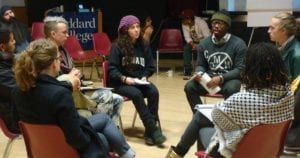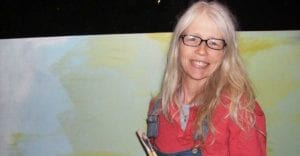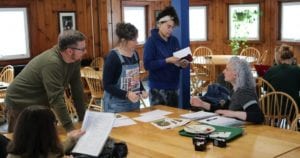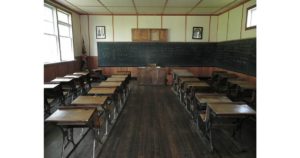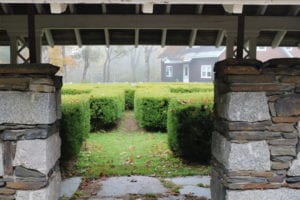By Richard Panek

The 16-year-old student has an idea, but she doesn’t have the maths to support it. She does, however, have a drawing. She submits it to her tutor. He examines it, then delivers his verdict.
“This is not science,” he says. “This is story-telling.”
He’s right: Through her art she has told a story. But he’s also wrong: She’s told science, too.
The scene is from Tom Stoppard’s Arcadia, a play that I (as well as other members of the MFAW faculty) like to assign to advisees, perhaps because one of its subjects is creative writing itself. As usual in Stoppard’s work, the play is a petri dish of philosophical battles of wit. In this case, one of the major conflicts is between the art of story-telling and the science of fact-gathering—between the nature of narrative and the narrative of nature.
In an English country house in 1812, a student has been wondering why a steam engine can not re-energize itself forever. Why can’t it function as a perpetual motion machine? Now she believes she has arrived at the answer: heat loss. And yes, she understands the implications of a physics whose arrow of time goes in only one direction—toward increasing disorder.
“So the Improved Newtonian Universe must cease and grow cold,” her tutor says. By “Newtonian universe” he means not just the cosmos but the whole clockwork kit and caboodle. Classical physics. Cause and effect. Determinism. Certainty. “Dear me,” he adds, dryly.
The pupil has, in effect, discovered entropy. Or rather, “discovered.” She won’t get the credit for it, in part because her drawing will disappear for nearly a couple of centuries—half the play takes place in the present day, in the same house, as scholars puzzle over the drawing and other documents—and in part because all she has to show for her insight are her artwork and some inadequate equations.
But what if she had made the discovery? Would it matter that it was she who made it? Why would it, if the discovery were out there, waiting to be made? Was the discovery out there, waiting to be made?
The nature of scientific discovery has been a subject of debate at least since Plato wrote a parable about shadows on a wall. The Nature of Scientific Discovery is also the title of a volume of transcripts from an April 1973 Smithsonian Institution symposium commemorating the 500th anniversary of Copernicus’s birth. Three or four years ago, I found myself pulling The Nature of Scientific Discovery off my bookshelf and returning to a favorite passage. In a discussion of “Discovery in Art and Science,” the moderator, John U. Nef, at the time of publication a University of Chicago emeritus professor of history, recounts an anecdote he has heard about the theoretical physicist Werner Heisenberg:

“I am told that Heisenberg is a very good player on the piano, by the way. He was in residence at Cambridge not too long ago and they asked him if he would play.
“He sat down at the piano and played from beginning to end Opus 111, the last sonata of Beethoven, which is an absolutely unique work. All the dons were more and more overwhelmed by this music, and there wasn’t a sound when he finished.
“Heisenberg is reported in this connection to have discussed the difference between science and art. ‘If I had never lived, someone else would probably have formulated the principle of determinacy. If Beethoven had never lived, no one would have written Opus 111.’”
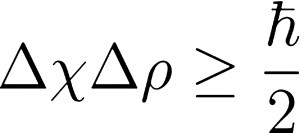 The implication is that scientific discovery is deterministic. That Plato was right: The forms are out there, waiting to be discovered. That even if what you’re discovering is the principle of uncertainty, the discovery is certain. That there is something inherently Newtonian about scientific discovery, even when the discovery is the demise of Newton’s universe.
The implication is that scientific discovery is deterministic. That Plato was right: The forms are out there, waiting to be discovered. That even if what you’re discovering is the principle of uncertainty, the discovery is certain. That there is something inherently Newtonian about scientific discovery, even when the discovery is the demise of Newton’s universe.
But what of artistic creation? What of story-telling? In Arcadia, the tutor offers a distinctly minority opinion when he cautions his student not to expend too much grief on the burning of the library at Alexandria: “The missing plays of Sophocles will turn up piece by piece, or be written again in another language.” But this discussion comes early in the play, before the death of determinism. As one of the scholars from the present day says, “We’re better at predicting events at the edge of the galaxy or inside the nucleus of an atom than whether it’ll rain on auntie’s garden party three Sundays from now.” The presence of too many variables renders an outcome unpredictable—and what could have more variables than the artistic mind at work?
Or so the argument goes. Maybe if the nineteenth-century tutor had lived long enough to hear about chaos theory, he would have revised his interpretation of artistic creativity as being deterministic. Then again, maybe not, if only because in creative endeavors even chaos needs a curator—someone to sort through the random bits and shape them into a story.
Shortly after I re-read the passage in The Nature of Scientific Discovery about Heisenberg’s impromptu performance of Beethoven’s Opus 111, I had the pleasure of meeting the editor of the volume, the great Harvard historian of science Owen Gingerich. I mentioned the Heisenberg anecdote; thirty-six years after the publication of the book, Gingerich recalled the passage instantly.
Presumably it stuck in his memory because he had tried to fact-check it with Heisenberg himself. Heisenberg, Gingerich said, wrote back that he couldn’t remember if Opus 111 was what he had played on that occasion. This reply was music (if you will) to a historian’s ears: Heisenberg accepted the occasion itself as a given. The anecdote was true!
But was it factual? In addition to what music he had played, Heisenberg went on to question what scientist he had cited. In his letter to Gingerich, he wrote that he probably wouldn’t have mentioned his own work; he suggested he might have used the example of Einstein instead. For Gingerich, however, that possibility carried unpleasant complications. In Nazi Germany, saying that if Einstein had never lived someone else would have discovered relativity was anti-Semitic code. What had begun as a charming anecdote about art and science was threatening to devolve into the chaos of memory and ideology.
“So,” Gingerich concluded, “I decided to leave the quotation as Nef had said it.”
Now that’s story-telling.
* * *
A slightly different version of this essay originally appeared on The Last Word on Nothing.
From top: a scene from the 2011 Broadway revival; one detail of Beethoven’s Opus 111; the equation for Heisenberg’s Uncertainty Principle.


